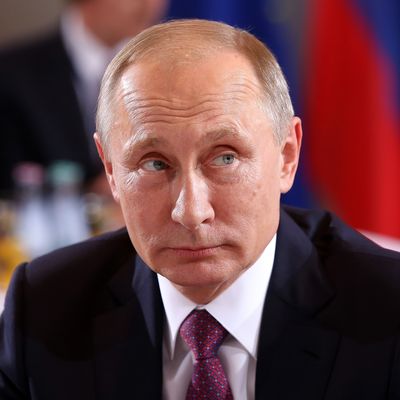
As if Republicans needed any more reason to rethink their newfound affection for Vladimir Putin, a new report says U.S. intelligence officials now believe with a “high level of confidence” that the Russian president was personally involved in efforts to influence the U.S. election.
Two senior officials told NBC News that Putin directed how material hacked from Democrats’ email accounts was used, according to intelligence from diplomatic sources and spies working for U.S. allies. One source said Putin was initially pursuing a “vendetta” against Hillary Clinton (their feud dates back to at least 2011, when Putin accused her of personally inciting protests by suggesting Russia’s election was rigged). But Putin’s goal eventually shifted to an effort to portray U.S. politics as corrupt and to “split off key American allies by creating the image that [other countries] couldn’t depend on the U.S. to be a credible global leader anymore.”
U.S. intelligence agencies said months ago that they believe Russia was behind the hack of Democratic National Committee officials’ emails, which were released by WikiLeaks. At the time, the intelligence officials said they believed only top Russian officials could have authorized the hack. NBC’s sources said that assessment was based on their knowledge of how the Russian government operates, but now there’s solid information tying Putin to the hacking effort.
CBS News backed up NBC’s report:
The news of Putin’s alleged involvement comes days after the Washington Post reported that the CIA believes Russia’s aim was to help Donald Trump, not just to generally disrupt the U.S. election process (other agencies have not confirmed that assessment). Clinton campaign chairman John Podesta’s emails were slowly leaked during the campaign, and this week the New York Times reported that the operation targeted a handful of Democratic House candidates as well. There is no evidence that Russia tried to directly interfere in the voting process, such as by hacking voting machines.
There was already talk of whether — and how — the U.S. should retaliate against Russia if the allegations are proven to be true. A former CIA official told NBC that Obama may respond before he leaves office. “This whole thing has heated up so much,” he said. “I can very easily see them saying, ‘We can’t just say wow, this was terrible and there’s nothing we can do.’”
U.S. intelligence agencies have reportedly stepped up their examination of Putin’s finances in light of the new revelations. The CIA official noted that exposing how Putin enriched himself via corruption may not embarrass him, since many Russians are familiar with those allegations.
But Bloomberg’s Eli Lake argued this week that Obama should still declassify information on the wealth of Putin and his inner circle — “their front companies, their homes, their yachts, their secret bank accounts” — to discredit them abroad. Lake writes:
The effect of a disclosure by the Obama administration though would be apparent in the West. Putin may not care whether his citizens know how corrupt he is. But I bet his Western bankers and business partners do. Fiona Hill, a senior fellow and Russia expert at the Brookings Institution, told me Monday: “The one thing about revealing this information is that it would stigmatize his wealth. This is shining a spotlight on him and his allies.”
Lake notes that it’s unlikely Trump would impose sanctions on Russia for election meddling, “But having a detailed, public record of Putin’s and his inner circle’s wealth would at least leave this option open for European governments.”
Writing in Foreign Policy, Max Boot said the U.S. government should convene an independent commission like the one that investigated the 9/11 attacks, and try more aggressive methods of undermining Russia:
Possible responses can run the gamut from further sanctions — including financial and travel freezes on individuals responsible for the hacking — to retaliation in kind. Putin likes leaking Western emails. How would he like it if the National Security Agency leaked the communications between him and his cronies? Or if the U.S. intelligence community released details about his widely rumored overseas bank accounts? This could undermine his hold on power by puncturing his aura of self-righteousness and could even lead to asset freezes that would punish him in the pocketbook.
None of that seems likely under the Trump administration either, but at least one senator is undaunted by the president-elect’s dismissal of reports about Russian hacking. Senator Lindsey Graham called for a tough bipartisan stand on Wednesday — and revealed that his campaign email account was hacked too.
“They’re trying to destabilize democracy all over the world. Not just here,” he told CNN’s Wolf Blitzer. “Here’s what we should do. We should tell the Russians that on no uncertain terms, you interfere in our elections, we don’t care why, we’re going to hit you and hit you hard, we’re going to introduce sanctions, it’ll be bipartisan.”
And what if U.S. lawmakers can’t come together to push back against Russia’s election meddling? Fiona Hill of the Brookings Institution tells the Washington Post that while right now it looks like Trump’s election is good for Putin, a less-predictable U.S. government may not work out how he hopes. “The land of unpredictability and surprise is the land that Putin and the Kremlin have inhabited for the last part of the last 10 years,” Hill said. “But now they’re not alone. Trump is going to be the great disrupter.”






























